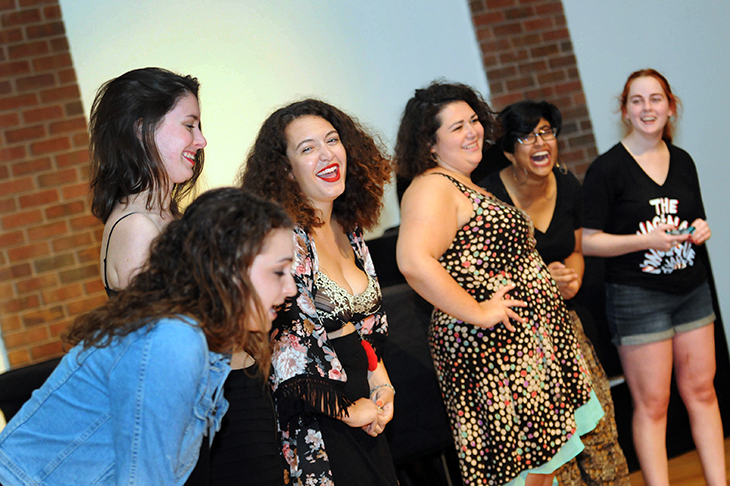"Vagina Monologues" comes to campus again

Student actors in the 2015 Vagina Monologues at Tulane University have a laugh during a dress rehearsal on Wednesday (April 8). The first show is Friday (April 10). (Photo by Cheryl Gerber)
The Vagina Monologues was created to liberate women by speaking candidly about their bodies in the late 1990s. A tweaked rendition of the play containing new topics relevant to college women is being produced, directed and performed by Tulane University students Friday (April 10) through Sunday (April 12) on the uptown campus.
Shows begin at 8 p.m. and take place in the Kendall Cram Lecture Hall in the Lavin-Bernick Center.
The original production written by Eve Ensler uses humor to discuss the topic of traumas endured by women. The goal then was to playfully promote comfort in discussing all that womanhood entails and to provoke conversations about more serious matters like rape.
But what humor does a college-aged woman find in a matter like childbirth in 2015, when studies show the birthing age of college-educated women begins much later than it did 20 or 30 years ago?
Samantha Campbell, a senior who is co-producing the annual Tulane production of the Vagina Monologues along with Manali Souda, says they"ve introduced three new monologues that will help to make the production more inclusive.
“Expectations” will tackle the issue of sexual assault on college campuses. “This is for us” addresses issues plaguing women of color, and “How to be a girl” is a set of narratives based on a podcast of the same name that follows a single mother raising a 6-year-old transgender daughter.
“We held a discussion earlier this year called the "Vagina Dialogues" where we discussed the play"s relevancy, and what changes we"d like to see,” says Campbell.
That discussion, she says, allowed the group to develop the idea to make additions to the monologues.
Admission is $8 for faculty, staff and students and $10 for the community. Proceeds go to Womanspace, a local nonprofit that serves homeless women with mental illness or substance abuse problems.
“There are a lot of women who were left out of the original dialogues. We have made it more inclusive.”—Samantha Campbell, producer
